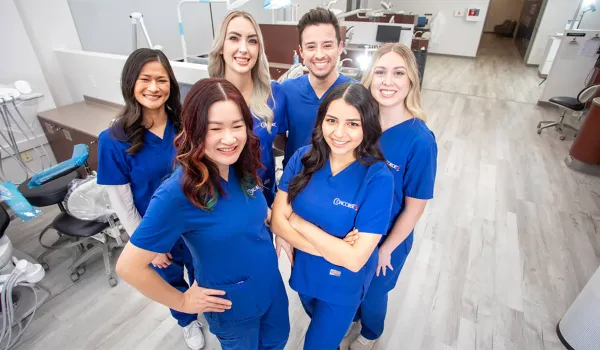
Getting to a sit-down, face-to-face interview is hard enough. When searching for health care careers, you first must fill out applications, submit resumes, probably even do a pre-interview with a human resources person over the phone, all before even getting a sniff at a face-to-face meeting. So, when you get face-to-face, you obviously want to do well.
When you get down to it, doing well in a sit-down interview is like excelling in your favorite sport or any other activity - it takes practice, practice, practice.
Identifying and studying "common interview questions"
Alex Nguyen, Graduate Employment Specialist at Concorde's campus in Portland, Or., said practicing common and behavioral interview questions is extremely important to acing a face-to-face interview. Searching "common interview questions" on a search engine like Google can provide plenty of questions that might be asked during an interview.
"Identifying these common interview questions will be key to formulating the desired answers," Nguyen said. "After a couple of practice sessions, it is encouraged to practice with a friend or family member and ask for their feedback."
"The behavioral questions are a bit tricky when it comes to answering them. By coming up with a few examples from previous work experiences, these examples can be used to answer these difficult questions by putting the story together with the desired example."
Just be yourself
Another piece of advice for acing the face-to-face interview, Nguyen said, "is to simply be yourself... with the codicil of being confident and friendly at the same time. Interviewers want to meet with candidates and discuss the opportunity to determine whether they are able to work together."
"Confidence is very important as well as being very friendly," Nguyen said. "They will try to find any red flags from responses to interview questions to ensure they are hiring the best candidate for their team."
Signs an interview isn't going well
There are many signs that occur during a job interview that go a long way to tell just what the hiring manager is thinking. If you see too many of these signs during an interview, well, best move on to the next listing.
"It behooves you to read between the lines and gauge the interviewer's actions and responses, so you can shift your approach, presentation style, or better clarify your answers," Lynn Taylor, a national workplace expert and author of "Tame Your Terrible Office Tyrant: How to Manage Childish Boss Behavior and Thrive in Your Job," said in an article in the Business Insider.
Much can be determined by reading body language, Taylor said, and those subtle cues can tell you exactly how they feel about you as a candidate.
The article listed 15 telltale signs an interview probably won't end with a job offer. Here are a few highlights.
- The hiring manager doesn't maintain eye contact. If you feel like saying, "Hey ... I'm over here!" as your interviewer seems to be looking everywhere but at you, it's not a great sign.
- They seem distracted. If the hiring manager is texting or checking email, or walking around the room as you speak, it's not looking good for you.
- The interviewer cut's the interview short. There might be a legitimate excuse, like a personal emergency, but if the hiring manager wraps things up quickly and doesn't explain or apologize, that's not a good sign.
- They don't listen carefully to your answers or ask pertinent follow-up questions. If you feel like you're speaking to a wall, try a different tack, such as asking for their opinion on the topic. Once you get the interviewer talking, they're more likely to perk up, Taylor said.
- There's little discussion or enthusiasm about your skills, accomplishments or goals. This might seem obvious, but it's worth mentioning.
- The conversation doesn't flow, and there are lots of pauses or interruptions as you try to respond. Sometimes, the chemistry just isn't there. And, that never bodes well for success in an interview.
- You get the limp handshake. Never a good sign. Still, always be firm with yours.
Stay Positive
If you detect any signs that an interview is going badly, it's important to maintain your confidence and a positive attitude, no matter how discouraged you might be.
"The hiring manager might just be distracted for other reasons or could be having a bad day," Taylor said. "So don't give up and shut down."
"Maybe the fit just isn't there, or you had an off day. In the worst-case scenario, by looking for subtle cues, you'll be better prepared at the next job interview."
The Importance of Sending Thank You's
"Thank you notes are essential," said Joan Kilna, BHRM, Graduate Employment Specialist at Concorde's campus in Portland, Ore. "If an employer is looking at two candidates with equivalent experience and excellent interviews, sending a thank you note can put you over the top."
A good thank you note can be used for other purposes, Kilna said. You can use a thank you note to give a different answer to a question you answered badly. Use a thank you note to follow up on a question you didn't know the answer to. Write a thank you note that reinforces your understanding of the job requirements.
"Thank you notes should also be used after you meet someone for networking purposes, such as after a job fair, an association meeting or a lecture," Kilna said.
She added that, while thank you notes are not as formal as cover letters, they should look professional and show good communication skills.
It is acceptable to send a thank you email instead of a handwritten note, but your note should be sent within 24 hours of the meeting.
"Specify the time and date of the meeting so they can quickly connect your note to your interview," Kilna said.
Best Practices When Sending a Thank You
Cassandra Geddes, Senior Graduate Employment Specialist at Concorde's campus in Jacksonville, Fl., thinks an email is the most effective and efficient method of sending a thank you. Timeliness of delivery is the key
"I believe timing is everything, so in my experience of coaching students and graduates, I strongly suggest sending an email within a day of the interview," Geddes said. "Electronic communication is how most communicate today."
Kaitlin Jackson-Ferriot, Senior Graduate Employment Specialist at Concorde's campus in Garden Grove, Ca., added that if you interview in front of a panel or group of people, it's important to write individual thank you letters to each person. She agrees that, in today's high-speed, electronic world, email might be the preferred method.
"Thank you letters set you apart from other candidates, make it personal," she said. "If you are going to make it generic, then don't bother. People forget to thank employers for taking time out of their day to meet with you. It is important to take note of."
Other points to remember when interviewing
Karen Blanks, Graduate Employment Specialist at Concorde's Kansas City, Mo. campus, has many years of experience in workforce/job development and has a nine-point primer for succeeding in the live interview.
- Be on time
- Be dressed for success
- Have a portfolio with resume, references, and copies of certificates and awards
- Bring a pen with which to take notes
- Take notes during the interview
- Practice your 30-second commercial prior to the interview
- Smile
- Ask pertinent questions
- Ask for the position
By following these simple guidelines, you could be on your way to acing your next in-person interview. If you feel you need some help with getting things in order, our graduate employment specialists are here to help, just reach out!
Take The Next Step Towards a Brighter Future
We have a Concorde representative ready to talk about what matters most to you. Get answers about start dates, curriculum, financial aid, scholarships and more!




